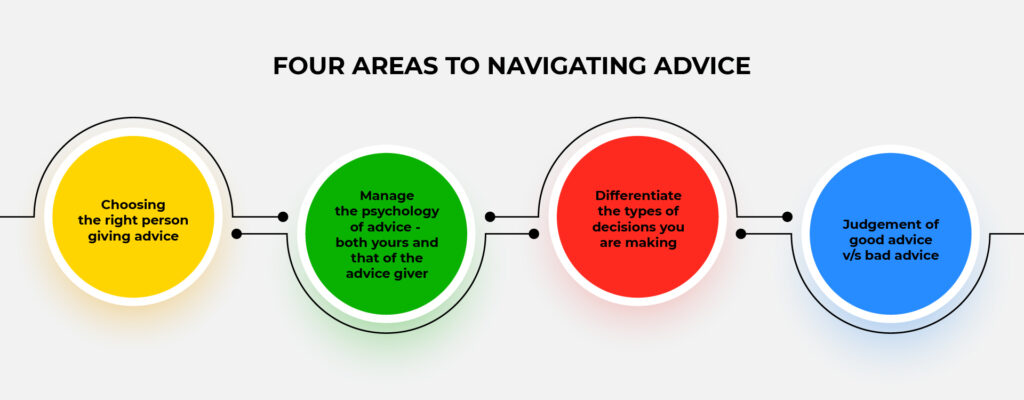‘To be the person who will give and not take, is not a matter of pride or generosity, but probably a conceited view of your superior self-sufficiency’, is an apt statement with regard to founders, for that matter anyone, who has inhibition in asking for help when needed.
It takes a lot of courage, confidence and willingness to seek help in order to be a great leader and entrepreneur who can forge a new path and achieve what others have not been able to accomplish in the past. It is also very important to be self-aware that you are going to make a bunch of mistakes during your journey, and be more than just okay with it.
Shying away from asking for help when in need would lower your chances of coming out of difficult situations and achieving success. I have no second thought to say that finding the help you need is part of your job as an entrepreneur, and learning to ask for it will bring you that much closer to success.
‘‘
Confident leaders are those who are prepared to admit they don’t have all the answers and are willing to ask for help
Founders always have the pressure of many responsibilities on their shoulders of conceiving a world-changing vision for their new product, impressing potential investors, rallying employees and exhibiting the business acumen to navigate through various stages of growth of their business among others. The challenge emerges when you have to be dynamic in your approach and thoughts to pivot in volatile and changing situations like recession, pandemic. That is when the urgency of the need for help by way of advice arises.
There is a natural inclination for founders to retreat and turn inward in face of crisis. They feel insecure and demeaning to look out for advice from outside and even within the company whether the situation, for example, is of unprecedented spike in demand or slowdown in demand.
Founders shouldn’t feel that they have to go it alone. An abundance of support and high-quality advice can make all the difference in difficult times, which means the importance of getting the most out of your existing network of advisors and investors need not to be overemphasized. Research shows that most founders do not know how to ask, can’t ask, or do not want to ask.
Founders are aware that there are no tried-and-true play books available on demand for the difficult situations founders are facing during the course of their path. Advice is by no means a silver bullet. The truth is that no one person — founder, investor, advisor or otherwise — has all the answers to every problem. An ability to effectively seek and hear out different perspectives from various sources can make a meaningful difference as founders try to fix the things for their startup. In other words, the mere act of listening, collecting and evaluating advice, even if it’s ultimately discarded, can be a useful guide for founders when all are not good. .
Confident leaders are those who are prepared to admit they don’t have all the answers and are willing to ask for help. Acknowledging your fear to ask for help but moving forward in spite of it makes a leader who knows when to ask for help, learns how to accept it with grace and is willing to offer help in return.
Building a successful business all alone simply is not possible, yet many entrepreneurs shy away from asking for help are support even within the company. The main reason for this is fear of rejection. You may consider the following points to remove your fear of rejection and increase the chances of getting what you need.
People want to help.
Researchers, academicians, theologians, founders, investors, and leaders all agree that helping others gives them a greater purpose and makes them feel good about themselves. The want to help others is a natural instinct that some studies show is present at birth. Give others an opportunity to help you, it makes everyone feel satisfied and happy.
In the midst of uncertainty and shifting priorities, your advisors will be more than interested to give you a helping hand by involving in the decisions you’re making as a founder. But without the right structure in place for asking and receiving advice, even a well-intentioned advice can only create more noise that complicates your decision-making process.
Patrick Ewers, an early LinkedIn director and relationship-building expert, agrees that the concept may sound remarkably simple, but he rarely sees people taking advantage of it. Ewers introduced the idea of ‘value payloads’. “I love the term value payload because it sounds so tangible,” says Ewers. “Value payloads are anything you provide to people that could help them. They could be introductions to people they want to meet, articles about a problem they are trying to solve, a note saying you saw their work and sent it to someone else. Most of the time it requires sending one email, which is easy to make a habit.”

Allusion of transparency.
Thinking that others should see what you’re struggling with and voluntarily step in to help is referred to by psychologists as allusion of transparency. I have heard some founders talking about their belief that someone in their life should know what they need and that they shouldn’t even have to ask. This is a misplaced expectation that may lead to disillusionment at times. Just ask for help, it makes life much simpler because no one is a mind reader.
No one will stop liking or respecting you.
It is nice to be kind and respectful, but let them know that you will understand if they are unable to offer you help, and ask your question outright without beating around the bush or becoming overly apologetic.
There are numerous important decisions resting on your shoulders as founders. You feel the weight of your employees, investors and advisors trusting you to make the right decisions, often with imperfect information. Asking for help from one of your advisors or investors or peers or senior employees can feel like you’re admitting that you don’t know something you’re supposed to. The best way for building deeper and meaningful relationships with your advisors and investors is by being candid and vulnerable.
First of all, you need to stop thinking that asking for help will be inconvenient to others. Asking for someone’s help is a sign of respect and will make them feel good. Follow these rules: try to figure out the answer before you ask for help? Next, think about the problem. Lastly, make a list of questions to ask. This will help your preparation make it more comfortable for you to ask for help.
Check how your colleagues ask for help
Your fears may not be unfounded that asking for help where you work could be perceived as a sign of weakness. If that’s the case, then find the ways others ask for and accept help at work. Watch and even ask someone who could help you with this critical, simple but important question: “What might be the best way to ask you for help on this project?” Let people give their perspectives on how to do it.
‘‘
The truth is that no one person – founder, investor, advisor or otherwise – has all the answers to every problem.
Give them details.
Rather than living with the problem and waiting for the other party to jump in to save you, tell them exactly what you are looking for. Sure, it feels better if they step up and offer help without you asking for it, but it’s not fair to expect that from them.
Take the guesswork out of it for the other person; when you lay it all out you set them up for success and you’ll get what you need from them.
Instead of seeking advice, ask for their candid feedback, additional information, more data which is a whole different story. Look for someone who can help you think about a problem in a way that you haven’t considered.
Everyone needs help in life, no matter who you are. The important thing is knowing who to go to for help and doing your due diligence in researching the issue first. After that is completed, approach the expert and let them know what you have found during your research and then your problem. This will show them that you are in real need of their expertise.
Here are the four areas to navigating advice:
- First, choose who is in your network of people giving advice
- Second, manage the psychology of advice – both your psychology and that of the advice giver
- Third, differentiate the types of decisions you are trying to make when getting advice
- Fourth, make judgement about good advice vs bad advice
Maximize strong advisor relationships.
As a founder, you’re used to measuring the success of your business with quantitative numbers, from pipeline to revenue to customer retention. However, advisory relationships have limited metrics to measure success and rather feedback tends to be qualitative. Amy Chang, founder of Accompany (a networking startup acquired by Cisco) and current EVP and GM at Cisco Collaboration, has mentioned that she amassed many advisors over the years but struggled with measuring the effectiveness of these relationships and their contributions.
Tell them why you chose them specifically.
In some instances, it’s a good idea to let the other party who is the advisor know why you chose them for help in the first place. You preempt the advisor by saying that it’s sometimes difficult to do everything for yourself. By stating the facts and your needs up front you can avert any attempt on the part of the advisor to dismiss your needs. He also knew exactly which of his many skills you are depending on to help you out.
When a specific someone comes to mind, be forthright about it. They will feel good about your observations and it helps to move the conversation right to the point.
Thank them but don’t make it transactional.
Like all successful relationships, advising is a two-way street. As a founder seeking advice from your mentors, investors and advisors, it’s crucial to make sure that you are demonstrating appreciation for those that help you tackle the twists and turns of running a startup. However, right now things are so chaotic that just saying “thank you” to those that have provided game-changing advice can get lost in the midst of other to-do list items.
Offering a favor in return for a favor can backfire on you as it can seem manipulative because we all know that offering a return favor makes it harder to say no. Thank them tactfully. A small gift card in the mail, flowers, or an otherwise meaningful token of your appreciation are all appropriate gestures.
Your friends, colleagues, peers, investors and relatives all have good reason to help you since they respect and care for you. Give others an opportunity to lend a hand, because it can make everyone happy.

Know what it means to follow up
This is one of the most important things that many don’t care about much. Whatever advice someone gives you, give them feedback on how it was considered, acted on or applied, and what happened as a result. Your advisors care deeply about giving advice or creating connections that make an impact for your business and want to know their time is being well spent. Letting them know that their guidance had an impact on you and your business is a critical best practice that will help you, them and other founders. However, one of the challenges involved in the follow-up process is staying organized and keeping track of where advisors have been helpful, especially when you spread your search for help across multiple advisors, investors and mentors.
Advice Paralysis
A piece of caution here. One of the best pieces of advice about advice I have heard came from Dennis Hightower, the former head of Disney International. “There are 13 ways of doing anything, and 11 of them will work. Just pick one and do it,”. In other words, there is not usually only one right choice. So most of the time, making a decision quickly and moving forward is the best way to take advice. Don’t worry about finding the one true path because often there may be many paths that can lead to success. Don’t get caught in advice paralysis.




